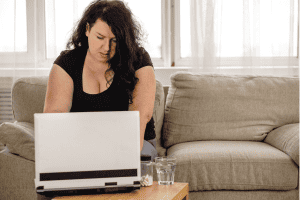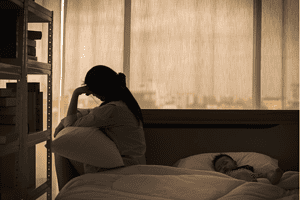Grief doesn’t stop at Christmas – navigating grief through tough events
Let’s talk about grief and tough events, like Christmas.
As your family, friends and colleagues are preparing for those familiar traditions and routines that you participate in around this time of year…you’re aware that this year is different…
Previously, this has been a time of celebration, reflection, and of course some stress too.
However, this year, there’s also…grief.
Grief itself can take many forms. Perhaps you’re experiencing grief for a birth that didn’t go to plan, or the unimaginable heartbreak of pregnancy loss, or grief for some of the changes birth has brought to your life…
If any of this sounds familiar to you, please know you’re not alone – and, there is support available during this time (support resources are included at the end of this post).
In this post, we’re going to explore how to navigate grief through tough events, including ways of recognising and coping with the feelings of grief.
Let’s start by exploring what grief is and how it can be connected to birth experiences.
What is grief?
Grief is that most powerful and heart breaking of emotions that we experience after the loss of something or someone we care about.
Whilst each person’s experience of grief is unique, certain events, such as Christmas, can be more painful when living with grief.
This is especially true if you’re grieving a loss that cannot be openly acknowledged, hasn’t been socially accepted or can’t be publicly mourned. For example, when balancing grief for the loss of freedom you may be feeling after having a baby, together with the expected gratitude you ‘should’ be feeling.
This type of grief (called disenfranchised grief) can be particularly painful around events like Christmas, where others may be unaware of what you’re going through – if it feels like you have to ‘put on a happy face’ or pretend that everything is fine, it can be helpful to talk to a grief professional who can provide confidential space for you to acknowledge and process your grief.
Ways of recognising feelings as grief
When you’re grieving you may experience many different thoughts, emotions and physical sensations. As unusual or unexpected as some of these may seem, they are a true and natural expression of grief.
Grief may look like:
- Shock, numbness, denial or disbelief
- Feeling confused, disoriented and forgetful
- Searching for reasons ‘why’ the loss happened
- Feelings of guilt, anger, frustration, shame, and/or despair
- Experiencing sadness, loneliness, and sometimes depression
- Changes in sleep and appetite (sleeping and eating more or less than is usual for you)
- A strong yearning for what or who has been lost (whether a person, a version of yourself or a particular situation)
- Physical symptoms such as aching muscles, stomach upsets and nausea
- Questioning spiritual beliefs.
Remember, there is no one way that grief looks, and no right or wrong way to grieve.
How to cope with the experience of grief
Here’s some strategies that may support you through Christmas or other challenging events.
1. Have clear boundaries with family
Practise saying no and setting clear boundaries with family. It’s okay to be honest with yourself and others about what you need.
Maybe your boundary is that you will go to an event, but only for an hour. Or, you might want to share with those around you how you prefer to be approached or supported right now – what does support look like for you?
When faced with your grief, other people may be at a loss for what to do or say…it’s okay to give them a little guidance, such as…“It helps me when you do (or say)…x, y, z.” And, “I find it difficult when you do / say…x, y, z.”
2. Take time to care for yourself
Allow yourself time and space to care for you – your body and your mind are working hard right now and you may need more rest and time out in order to recharge.
Part of caring for yourself is also giving yourself permission not to do the things you’re finding hard, whether that’s putting up decorations, shopping for gifts, or any other part of the season.
3. Take time to reflect, instead of avoiding
It can be difficult to sit with feelings of grief, however avoiding these feelings can prolong the experience of grief.
You may like to make some time to reflect on these questions:
- Do I want this Christmas / this event to be the same as usual, or to take a break from tradition? It’s okay to take a break if it feels too much this year.
- Do I want to honour or include my loss in some way? (For example: talking, sharing memories, lighting a candle, dedicating something special to what is being grieved, or even creating a new tradition).
- What does support look like for me right now? Does talking to someone feel supportive, or do I need practical support with meals and chores, or is it something else that would nurture me, like eating a favourite meal, or taking a walk in nature?
A few more thoughts on grief…
As you grieve, it’s okay to allow yourself to experience moments of comfort and even of happiness. Our emotions are not either/or. You can experience a multitude of emotions in any one moment – laughter and happiness don’t mean a dismissal or neglect of your grief.
Also, your grief is your own and no one else can tell you when it’s time to “move forward” or “feel differently”. Try to let yourself feel whatever you feel. It’s okay to be angry, to cry, to not cry, to laugh.
Supporting someone else through grief
If you know someone who is grieving this Christmas, give them a call, write them a special card, invite them over for a quiet get together. Let them know that you understand that it may be a hard time for them because it’s Christmas. Check in with them and ask, “how can I support you right now?” If they’re not sure, reassure them that you’ll be there when they’re ready.
Need grief support during the holiday season?
Grief from any significant loss needs support. Disenfranchised grief from a traumatic experience of birth is no different. This darkness you feel can be lifted, and you can heal. It can get better through counselling or debriefing your experience with someone who understands birth, trauma and grief.
If you need grief support throughout the holidays, here’s some services that are available:
In an emergency
Triple Zero (000) – if you or someone you know is in crisis and you think immediate help is needed.
24/7 phone support
Lifeline 13 11 14 – Provides 24 hour access to crisis support, suicide prevention and mental health support services. They also offer online chat and text messaging services through their website (https://www.lifeline.org.au/).
24/7 support for grief and loss following miscarriage, still birth, pregnancy termination and death in infancy
Red Nose 1300 308 307 – 24 hour support for parents and families following the death of a baby during pregnancy, birth, infancy or childhood.
SANDS 1300 072 637 – 24 hour support by trained parent supporters with a personal experience of grief following miscarriage, stillbirth or the death of a baby.
Perinatal Emotional and Mental Health Support
PANDA (Perinatal Anxiety & Depression Australia) 1300 726 306 – free telephone counselling helpline (Monday to Saturday).
As I’ve said earlier, the darkness of grief can be lifted, and you can heal. It can get better through counselling or debriefing your experience with someone who understands birth, parenthood, trauma and grief. Reach out if you feel the pull.
Fiona x

My name is Fiona Rogerson and I am a registered Trauma and Perinatal Perth Counsellor and Childbirth Educator. I work with women and men to overcome emotional and psychological hurdles surrounding birth trauma, childhood trauma, traumatic experiences, as well as conception, pregnancy, postpartum, parenting and identity. I am also available to provide clinical supervision, mentoring and professional development training and workshops. I am based south of the river in Perth. To work with me, email at fiona@fionarogerson.com.au or phone 0402 017 425.














